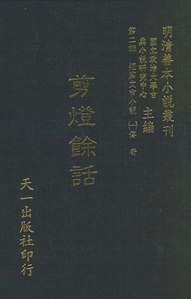Jiandeng Xinhua
 A copy of Jiandeng Xinhua, collected by the National Library of China | |
| Author | Qu You |
|---|---|
| Original title | 剪燈新話 |
Publication date | 1378 |
| Publication place | Ming China |

Jiandeng Xinhua (剪燈新話, lit. New Stories Told While Trimming the Wick or New Stories After Snuffing the Lamp; 1378) is an early Ming dynasty collection of Chinese stories by Qu You (瞿佑).[1][2] The book consist of 21 stories in 4 volumes. It was succeeded by a second book Jiandeng Xinhua wai er zhong.[3]
Background and precursors
[edit]Jiandeng Xinhua came from a long line of Chinese story collections that goes back to end of the Han dynasty. Notable Chinese story collections that dates from at least the 3rd century include: Bowuzhi, Soushen Ji, Xijing Zaji, Lieyi Zhuan, A New Account of the Tales of the World, You Ming Lu, Shi Yi Ji, Miscellaneous Morsels from Youyang, Taiping Guangji, Yijian Zhi, etc.
Some of the most famous Chinese and East Asian folk or fairy tales, such as Li Ji slays the Giant Serpent, Renshi zhuan, The World Inside a Pillow, The Governor of Nanke, The Tale of Li Wa, and Hongxian can be found in these collections.
Influence
[edit]Jiandeng Xinhua, a major success at the time, proved to be highly influential later on, as it directly inspired some of the most popular fictional literature in other places. It became the model for the first fiction in Korean literature, Kumo Shinhwa, also written in the Chinese language,[4] and it was also the model for the Vietnamese collection Truyền kỳ mạn lục,[5] and the Japanese Otogi Bōko and Ugetsu Monogatari, etc.[6]
-
A copy of Li Changqi (李昌祺)'s Jiandeng Yuhua (剪燈餘話), 1420, from Peking University collection. Li's Jiandeng Yuhua, which was inspired by Qu's book, was also a success
-
Nguyễn Dữ's Truyền kỳ mạn lục, 16th century
-
Ueda Akinari's Ugetsu Monogatari, 18th century
References
[edit]- ^ not Zhu Yu (朱彧; Wade–Giles: Chu Yü) as incorrectly cited in some sources
- ^ Rania Huntington - Alien Kind: Foxes and Late Imperial Chinese Narrative 2003 p25 "Foxes were not a frequent topic in the long poetic romances of the early Ming, the most famous collection of which was Jiandeng xinhua 剪灯新话 (New stories told while trimming the wick, 1378)."
- ^ Anne Gerritsen Ji'an Literati and the Local in Song-Yuan-Ming China 2007 p240 "Jiandeng Xinhua (wai er zhong) .. (New tales written while trimming the wick, two further versions) (Beijing: Zhonghua shuju, 1962)"
- ^ Dae-Sook Suh Korean Studies: New Pacific Currents - 1994 p123 "Kumo shinhwa, written during the author's five years as a recluse on Mt. Kumo in Kyongju, is believed to have been modeled on Zhu Yu's (1341-1433) Jiandeng xinhua (New Anecdotes Under the Lamplight), which appeared during the early
- ^ Salmon, Claudine, ed. (2013). Literary Migrations: Traditional Chinese Fiction in Asia (17th-20th Centuries). Institute of Southeast Asian Studies. p. 165.
It was then that he wrote his work modelled on the Chinese Jian deng xinhua...The welcome received by Jian deng in Vietnam was apparently no less enthusiastic. Nguyễn Dữ's imitation proves to us that this work was well-known at the beginning of the sixteenth century.
- ^ Jōo, Fumiko. "Reading Annotations: An Alternative Approach to the Reception of Qu You's New Tales for the Trimmed Lampwick in Tokugawa Japan".



